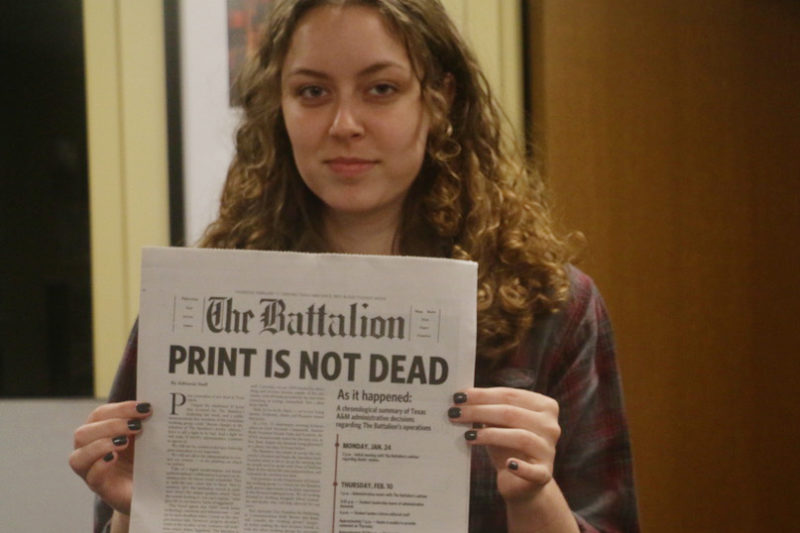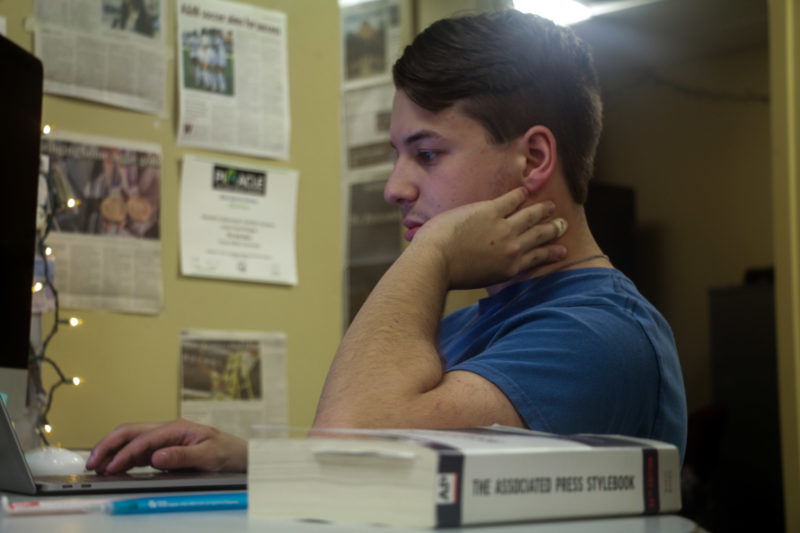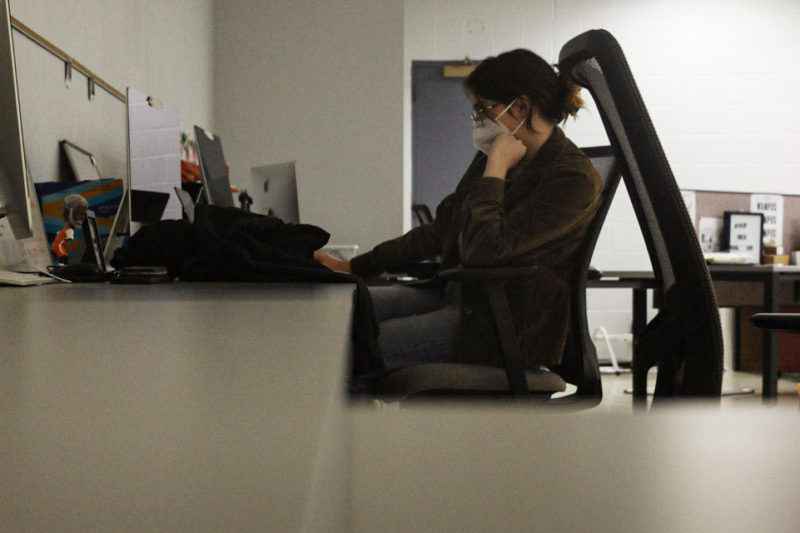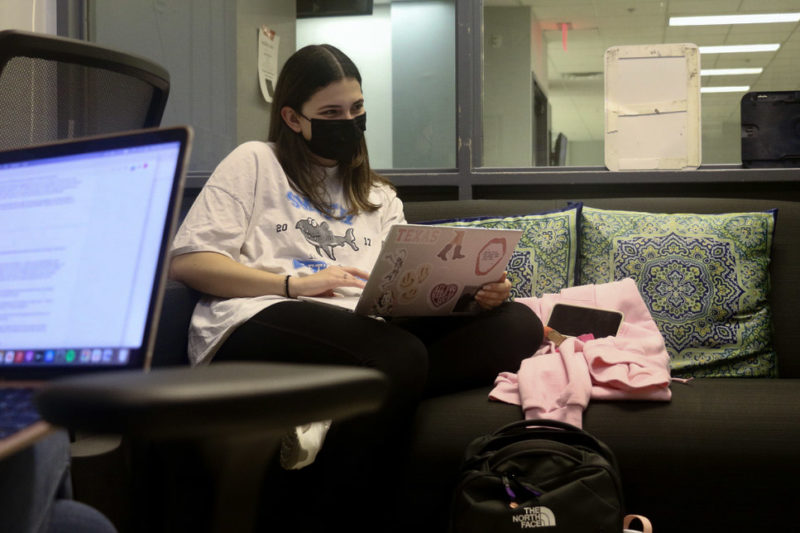Will Texas A&M’s The Battalion Survive if it Loses its Independence?
By Cristela Jones
Reporting Texas

Julia Potts, managing editor of The Battalion, Texas A&M’s student newspaper, displays the editorial written in response to the university president’s announcement calling for an end to the paper’s printed edition. Sloan Wyatt/Reporting Texas
In her senior year as an international studies major at Texas A&M, Myranda Campanella has climbed the ranks at the university’s student-run newspaper. Now, as she completes her final semester as editor-in-chief, she is helping to make a decision that will change The Battalion and student journalism at Texas A&M forever.
Campanella and a working group chosen by university President Katherine Banks must decide whether the 129-year-old student newspaper will become an online-only publication and move into a new journalism department or break ties with Texas A&M and become an independent paper, stripped of all university resources.
This decision comes after Banks’ administration demanded Feb. 10 that Battalion student leadership end print publication of the newspaper after its next edition, scheduled for three days later. Widespread criticism of Banks’ decision prompted her to allow The Battalion to continue printing until the end of the spring semester while its long-term future is being decided.
Banks asked a working group to “discuss options for distribution of The Battalion’s weekly publication, including consideration of digital content-delivery platforms” and to “assess how The Battalion can best achieve its mission to be a strong, independent student voice in the future.”

Assistant Sports Editor Jordan Epp, a journalism student at Texas A&M University, reviews and edits articles for The Battalion on March 6, 2022, in College Station, Texas. Other student publications around Texas have also been under pressure to end or reduce their print editions. Sloan Wyatt/Reporting Texas
This is not the first time Texas student newspapers have felt the pinch of college and university administrations. Other student newspapers in Texas have already been forced to abandon or reduce their print editions and move under the supervision of university journalism departments. Advocates for independent student journalism worry that greater university oversight opens the door to censorship by administrators unhappy with student newspapers’ in-depth reporting.
Banks said her journalism working group — composed of 20 A&M professors, students, alumni with Campanella and other Battalion leaders — is aimed at building a stronger journalism degree program at Texas A&M. Currently, Texas A&M does not have a journalism department but instead offers a journalism concentration in university studies housed in its department of communication. The Battalion has never been affiliated with the department of communication. However, many students who work for The Battalion major or minor in a degree housed in that department.
“I care deeply about journalism at Texas A&M,” Banks said in a Feb. 14 press release. “The reaction to this plan makes it clear that I should seek additional community feedback on the role of The Battalion and the rebuilt Department of Journalism, while also getting feedback about industry trends and future workforce needs.”
Reporting by The Battalion in March suggests that Banks was being pressured by outside groups such as the Rudder Association, a conservative alumni group that says it aims to preserve Aggie traditions and culture, to change the student newspaper.
In a July 2020 newsletter obtained by The Battalion, a Rudder Association member wrote, “The Battalion has become a publication with a singular point of view and very little diversity of thought. I don’t think there is any way we can change it into a campus ‘newspaper’ anytime soon, however, with the help of the student body, we may just pull it off. In the meantime, we will create an alternative student-run online newspaper off-campus with a different name.”
Campanella worries that Banks’ moves could lead to university control of The Battalion — fears echoed by Mike Hiestand, senior legal counsel for the Student Press Law Center, who has been helping to combat campus censorship for more than 30 years. The SPLC is a nonprofit organization that provides free legal help to student journalists and has paired a Texas lawyer with students at The Battalion as they weigh their next steps.

The Daily Texan photo editor Kara Hawley waits for one of her sources to join via Zoom on March 10, 2022, at the University of Texas at Austin. Student publications are protected by the law which says school administrators can’t control or censor content, according to Mike Hiestand, senior legal counsel for the Student Press Law Center. Sloan Wyatt/Reporting Texas
“The thing with student newspapers and student media in general is that school officials, while they have authority to control some of the non-content ways in which these programs are run, the law, at least at a public school, is very clear in that school officials, administrators have to keep their hands off the content so they cannot do anything that’s an attempt to control, manipulate or censor student voices,” Hiestand said.
Hiestand was also critical of how Texas A&M leaders informed The Battalion of their demands for change.
“The university’s reason for doing this is to focus more on digital,” Hiestand said. “Everybody’s kind of moved to digital, and that’s OK, but the way in which it’s being done is clearly not the way you want this to happen. Pulling the rug out from under them, creates all sorts of problems that wouldn’t be created if you did this in a more systematic sort of way.”
Brady Stone, university studies-journalism senior and member of the president’s journalism working group, said that despite the good in Banks’ plan to establish a well-oiled journalism department at Texas A&M, ceasing print publication of The Battalion has nothing to do with it.
“I had very specific ideas of what I thought print journalism could bring to a potential degree and could bring to students who are wanting to study journalism at Texas A&M, but then this decision sidetracked all of that,” Stone said.
Stone, who was the 2020-21 editor-in-chief of The Battalion, said that a week before Banks announced her decision, the journalism working group met for the first time to discuss the future of journalism at A&M, but the president’s plan to stop the presses was not mentioned.
“This group of … people who the university stressed were stakeholders in relation to journalism were present in this meeting, and not a single word of discussion about the decision to unceremoniously stop print,” Stone said. “It’s very, I think, hypocritical.”
The Battalion has been printing since 1893, first as a monthly publication, then as a daily and now a weekly that is distributed on Thursdays and also online. About 70% of copies are picked up by readers each week, according to Douglas Pils, general manager for student media at Texas A&M.
Pils said most of the organization’s revenue that pays its staff comes from advertisements and that printing the newspapers costs about $39,000 a year.
“The only money we’ve ever gotten from our (university funds) here at Texas A&M for about 20 years was about $21,450,” Pils said. “I know that other universities especially in the SEC and around the state provide a lot more money for student media because there’s more staff, more full-time staff at student media outlets.”
Student media at Texas A&M used to be its own auxiliary department, which meant it operated on its own and paid for six full-time staffers, until revenue began to decrease in the 2011-12 school year, according to Pils.
“I told my boss if we keep going this way, we’d probably run out of money in fiscal year of ’19 or even ’18,” Pils said.
In the 2018-19 school year, a working group recommended that The Battalion move to student organization status. The group also suggested that the university pay Pils’ salary, an ad manager salary and a position to study digital trends and figure out a way to make more money online. In 2019, the suggestions were approved by the Student Affairs Advisory Board, but the university ended up only approving the money needed for Pils’ position.
If the president or current working group decides The Battalion should cut ties with the university and become an independent student organization, the publication will lose its office space and Pils’ employment.
Student media leadership at schools such as Southern Methodist University, which absorbed its student newspaper, the Daily Campus, have had to deal with the consequences of losing its independence.
In 2018, the Daily Campus ceased print after the nonprofit board that oversaw the newspaper dissolved and it became integrated into the school’s journalism department.
The Daily Campus now operates as an online-only publication funded entirely by SMU. Audrey McClure, editor-in-chief of the Daily Campus, said that the organization has for the most part been able to maintain editorial independence but struggles with finding a healthy balance between journalism and classwork.
“The first couple years that I was here, there was some issues with some professors being like, ‘Oh, you have to submit to the Daily Campus, or you have to get published on the Daily Campus for your class grade,’” McClure said. “So, there was people being like, ‘Well, I need to get this in,’ and it’s you know, a shitty story so we wouldn’t publish it.”
Before 2018, the Daily Campus made money from print advertisements which helped make it possible for editors and full-time staffers to get paid for their work. Now, McClure and the six other students on-staff at the Daily Campus are not paid, which makes recruitment harder for prospective students.
“Technically, even though the website is probably cheaper overall, I think it also affects the visibility of the paper too because you see these empty newsstands from when the Daily Campus was independent and you think, ‘Well, that’s dead. That’s gone,’ so less students know or even care who we are,” McClure said.
Losing independence has also made it harder for The Daily Campus to raise outside money like independent student newspapers would because any efforts must be approved by university administration before the paper can accept any money.
“I think the biggest thing with The Battalion … is that it’s not so much that people are going to directly intrude on what you can publish or what you can or can’t do,” McClure said. “But they will take away the resources that allow you to do those things and have a really thriving environment for student media and that’s what I see here from what has happened.”

Faith Dufresne collaborates with two other general staffers at the The Daily Texan on March 10, 2022, in Austin, Texas. Like the Battalion, The Texan was also under pressure to end its print edition, but it was saved by university and alumni support. Sloan Wyatt/Reporting Texas
In 2013, the Daily Texan, the University of Texas at Austin’s student-run newspaper, was also at risk of losing its print publication, when the Texas Student Media board considered cutting it because of budget cuts and declining advertising revenue. That same year, the Friends of the the Daily Texan Alumni group was formed to help save The Texan.
“About 90% of the revenue of the Texan back then was coming from print,” said John Reetz, president of the Friends of the Daily Texan. “We were not really welcomed by TSM management at that time, but we put together a document, I think it was 40 or 50 ways to make money off of print, and that’s how we began.”
After a year-long deliberation, the TSM board moved under the Moody College of Communication and decided to reduce the Daily Texan’s printing schedule from daily to weekly.
The Daily Texan now survives in print and online after receiving support from William C. Powers Jr. when he was president of the university, the Moody College of Communication and the Friends of the Daily Texan.
Despite being affiliated with Moody College, which contains a journalism department, The Texan remains editorially independent from the university and student leadership at the organization remain the sole editors of content distributed online and in-print.
Reetz wrote a statement in support of The Battalion and urged the public to take what happened at the Texan as an example to the possibilities of what the continuation of print can do for Texas A&M.
“For the grace of God, (what’s happening at The Battalion) could have easily turned out that way for the Daily Texan if Moody had not been interested in it or if the university president did not recognize the importance of the Texan,” Reetz said. “A first-class university should offer all platforms for students. They will miss job opportunities if print is a stranger. It is not the time, Texas Aggies, to throw in the towel. It is the time to be creative.”